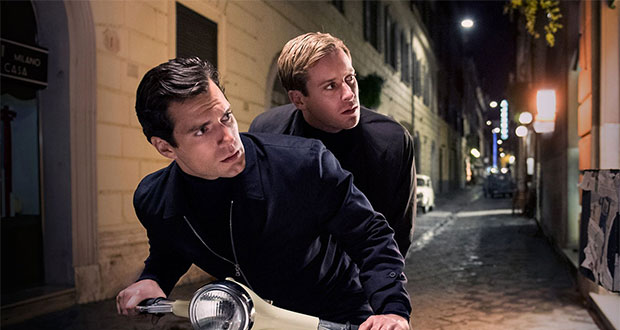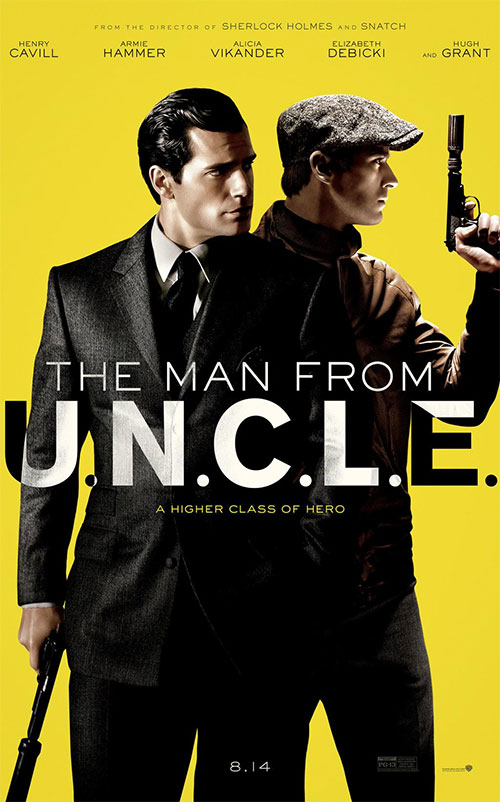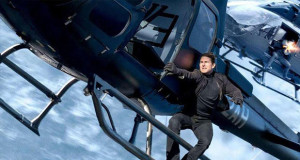Director: Guy Ritchie
Writer: Guy Ritchie
Cast: Armie Hammer, Alicia Vikander, Henry Cavill, Elizabeth Debicki, Hugh Grant
The original Man From U.N.C.L.E is a fifty year old television series, set against the backdrop of the Cold War as two spies – one American and one Russian – find themselves partnered together as culturally mismatched frenemies who have to set aside their countries hostilities to battle an international terrorist organization bent on world domination. Although I am too young to have seen the original series, I’m told that this evil organization is called “Thrush”. They didn’t opt to keep this name in the 2015 cinematic remake.
Although director and screen writer Guy Ritchie keeps the original Sixties setting for the film, part of the reason The Man From U.N.C.L.E still resonates today is that the relationship between America and Russia remains as frosty as ever. Films about spies that form an uneasy alliance that teeter between respect and mistrust is a time honoured cinematic motif and when done right, they result in some of my favourite spy thrillers.
Guy Ritchie, who made his name with the one-two combo of Lock, Stock and Two Smoking Barrels and Snatch, is the man responsible for resurrecting this property and upon consideration, I think he’s as good a choice as any. The spy genre is a pretty crowded landscape at the moment with James Bond, Jason Bourne, Jack Reacher and Ethan Hunt all crowding the box office. Ritchie rose to prominence with two sharp witted British crime capers that had memorable one liners and were shot using hyper kinetic camera work that thrilled audiences fifteen years ago. In Ritchie films, the style is the substance. And with so many of the other spy franchises focused on large action set pieces and straight laced storytelling, a tongue in cheek buddy movie set against the backdrop of the swinging Sixties is not a bad niche to carve out for yourself.
So does Ritchie successfully pull it off? Kinda. Mostly. In an interview with Robbie Collin on the BBC, Armie Hammer described the onset atmosphere of Ritchie’s film as being supremely relaxed and laid back. I think this breezy and nonchalant approach to film making is reflective of the final product. The leads in the film have a pleasing chemistry and sense of comradery with one another but the film is tonally inconsistent and occasionally a little loose around the edges with its pacing.
Henry Cavill is the dapper and debonair American spy Napoleon Solo. Solo attracts the attention of the CIA thanks to his prolific skills in committing heists and when he is eventually captured by the government, he is blackmailed into service in exchange for avoiding jail time. His counterpart is the no-nonsense Russian hulk Illya Kuryakin. Kuryakin possesses near superhuman strength which is established in his introduction where he rips the boot off of a car Terminator style. We learn that daddy issues are a source of his rage which he struggles to contain. Their respective governments pair them together to stop a Nazi villain who is developing weapons of mass destruction that would wipe out both superpower nations.
Cavill and Hammer both have the looks, talent and ambition to be established leading actors in Hollywood but they have yet to find the vehicle to take them there. Both also had high profile box office misfires in the form of Superman Returns and The Lone Ranger respectively. The Man From U.N.C.L.E isn’t a big enough film to necessarily catapult them to superstardom but I think it serves as a good platform to show what they can do. Ritchie’s script gives them a chance to shine – Cavill as a dashing and suave womaniser – and Hammer as a tormented monster with a heart of gold. I thought the two riffed off one another pretty well too when called upon to provide some comic relief. A sequence where they debate what to do with a captured enemy combatant whilst he fries in an electric chair behind them was a gem of a scene.
Alicia Vikander plays Gaby, an Eastern European femme fatale whose estranged father is the key to stopping the villainous Victoria Vinciguerra’s plans for world domination. Vikander turned heads earlier this year with her excellent performance in the sci-fi thriller Ex Machina. Although she isn’t really called upon to use the same level of acting chops in The Man From U.N.C.L.E, she delivers an entertaining performance as the talented and capable mechanic whose allegiances to the U.S or Russia aren’t totally clear.
There’s plenty about The Man From U.N.C.L.E that might feel derivative or overly familiar when the cards are laid on the table and we meet all the characters and their motivations are laid bare. But where the film shines is through Ritchie’s buoyant and playful direction. The film has plenty of action sequences as the spies go globe hopping in pursuit of Gaby’s father and Vinciguerra’s headquarters. Ritchie purposefully plays against audience expectations when constructing these sequences. A dramatic chase sequence on a water boat involving Kuryakin is relegated to a view out of a truck window as Napoleon Solo tucks into a hearty sandwich and a bottle of wine. A military raid of an island hideout involving dozens of armed troops is shot with a cheery screen wipe using four or five panels showcasing the action. The final moments of one of the films villains is revealed by a chronological mash up, where their demise is set in stone and then explained retrospectively. Ritchie’s creativity really helps set the film apart from its contemporaries.
The Man From U.N.C.L.E‘s final scene pushes hard for a sequel. If I was a director shooting films in exotic locales around Europe having a lovely time in the company of talented actors I would too. I’m not sure Ritchie will get it though as the film has only performed modestly at the box office. Which would be a shame. The Man From U.N.C.L.E is a spy thriller that doesn’t take itself too seriously and has a palpable sense of fun. I’d happily see them return for another go.
Review Overview
RATING
Good
Summary : A cheery, light hearted take on the spy thriller that is elevated by Ritchie's creative direction.
 The FAT Website est. 1999
The FAT Website est. 1999






